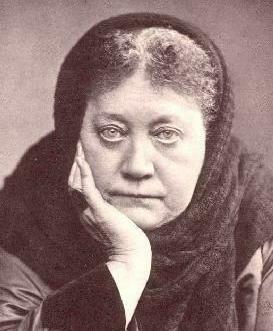
BLAVATSKY
AND THE SECRET
DOCTRINE

By MAX HEINDEL
CHAPTER II
Humankind has always persecuted, tortured, and killed those who in thought have been in advance of their age. Witness Copernicus, whom only a natural death saved from a fate similar to that which half a century later overtook Bruno. Galileo was harassed all his life, and finally when old and broken in body and spirit by the abuse of the clergy, was forced to retract on his knees all of his teachings which was at variance with the commonly accepted views of the time. The same fate was shared by countless others. The seed which these men had son, however, was not only indestructible, but grew and grew until one day the world woke up to find that what once was denounced as heresy had become the commonly expressed opinion. Then came the epilog of the drama--when a Thorwaldsen immortalised in marble the same Nikolas Copernicus who, once persecuted, was proudly claimed as her son by Russia, or when amid the cheers of his countrymen was reared the statue of Giordano Bruno on the same spot where fanatical monks had danced around his funeral pyre and burned the genius in the name of God.
At one time in the history of the West, men were scourged for the sake of the Christian religion. When Christianity became strong, it attempted to suppress science, which was then but a fledgling. Science, however, grew stronger and stronger, gradually forcing the Church into its present apologetic attitude. Then the world slowly sank into a state of unbelief. Nothing which could not be weighed or measured was accepted. Anyone who dared to assert the existence of anything superphysical was at once stamped as an impostor. Science and religion vied with each other in their efforts to heap obloquy and opprobrium on such individuals.
With the foregoing in mind, we can better appreciate the great moral courage of H.P.B., and see why that courage constituted one of her qualifications as a messenger of the Masters.
In the same materialistic attitude of the world of that day is also to be found the reason for making use of phenomena. Many thoughtful persons have sincerely regretted that this part of the subject should ever have been taken up by the Society, but H.P.B. always maintained that in the early days of her work these proceedings were absolutely necessary. This opinion was changed in the last years when the Master himself told her that phenomena had been a hindrance rather than a help to "The Secret Doctrine" in Europe and that it would have been better had only the philosophy been given.
In 1884 it was thought among the leaders of the Theosophical Society that the time had arrived for a revision and an amplification of Madame Blavatsky's first book "Isis Unveiled", and that she was to rewrite it, with the late T. Subba Row as co-editor. All through the year they collected material. Then Colonel Olcott and Mr. Cooper-Oakley formulated a plan, and it was announced that the work would be published in twenty parts of about seventy-seven pages each. But on the 8th of January, 1885, H.P.B.'s Master communicated to her the scheme of "The Secret Doctrine", and as a result, the original plans were abandoned.
Soon afterwards the heart trouble from which Madame Blavatsky was suffering became so serious that her physician, Dr. Mary Scharlich, insisted upon her leaving India if she would save her life. Acting upon this advice, H.P.B. left Adyar, the spot she loved most on earth, in the spring of 1885. We next find her installed in a cheap little inn on the northern slope of Vesuvius. The room is almost bare of furniture, the floor is of stone. Through the crevices in windows and door blows a cold wind which aggravates the rheumatism of the poor "old lady" as she sits writing at her rickety old table far from friends, alone in a foreign country, the language of whose inhabitants she did not understand, sick in body, and chafing under the injustice done her by those whom she had befriended. Thus, inauspicious were the circumstances attending the first work on "The Secret Doctrine".
In the fall of 1885 she went to the quaint old German town of Wurzburg. What associations this name calls forth--thoughts of Martin Luther, the stern and unflinching reformer who vowed against the Romish priests though the roofs of the city were covered with devils.
Not more staunch and unflicnhing was he than this new reformer who with dogged persistence, despite sickness and adverse criticism, toiled at her desk from day to day when she might have had ease and comfort.

|
[COVER] [CONTENTS] [INTRODUCTION] [BIOGRAPHY OF MAX HEINDEL] [CHAPTER I] [CHAPTER II] [CHAPTER III] [CHAPTER IV] [CHAPTER V] [APHORISMS BY MAX HEINDEL] [LINKS]

A Quarterly Rosicrucian Online Magazine
Click here to return to home page.